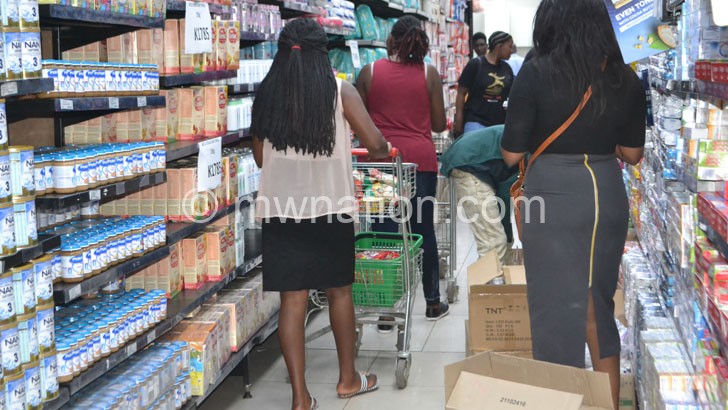Rising goods prices hit consumers hard
The Consumers Association of Malawi (Cama) says it is alarmed with the rising prices of goods amid the weakening of the kwacha and the Covid-19 pandemic.
Cama executive director John Kapito said in an interview that considering that the access to basic needs is a challenge, consumers need protection to maintain a decent standard of living
He said: “We are also witnessing the continued weakening of the kwacha, which is affecting prices of other goods and services on the market. These are matters that must be dealt with urgency in order to reduce the impact of high cost of living.
“We are also appealing to consumers to be assertive and check the quality and prices of goods every time they go out for shopping.”
Business News analysis show that in the five months period to September 9 2020, common goods retail outlet prices have increased, despite reduced incomes and loss of economic opportunities in the face of the Covid-19 pandemic.
For instance, the price of a 20 kilogramme (kg) bag of sunshine maize flour has climbed from K7 799.99 in May to K9 799.99 in September while Donnas eggs large tray with 30 eggs is now selling at K3 399.99 from K3 199.99.

The price of Mulawe cooking oil has moved from K1 049 to K1 159 while a 500 grammes (g) pack of kitchen salt has moved from K189 to K229.
The price of 200 bar of Butex laundry soap has moved from K229.99 to K249.99 while a 100g bar of Lifebuoy soap has moved from K399.99 to K509.99 with a 500g packet of Boom powder moving up from K1 149.99 to K1 249.99.
In construction sector, cement prices have moved up from an average of K6 500 to K8 500 per 50kg bag.
On the other hand, the price of a 12-feet 32 gauge iron sheet has increased by an average of K K950 from an average of K2 750 while a six-feet 28 gauge iron is now selling at K4 800 from K3 900.
The rising prices of goods has made life difficult for Blantyre-based Mirriam Chigwenembe, a single mother of four, who is working as a domestic worker in Chileka.
Chigwenembe, who earns K35 000 a month, has been making additional income through sand mining and washing clothes on Sundays, her off-day.
She bought a piece of land in Mdala Village and built a two- bedroomed house.
“The rising prices has made everything difficult for me. And with the pandemic, many people have suspended their housing projects, chocking my other income generating avenue,” she says.
Chigwenembe is, however, optimistic that once the economy starts ticking again and prices come down, she will be able to finish her house.
In the first-half of the year, the cost of living declined by 12 percent with figures from the Centre for Social Concern (CfSC) indicating that a family of six people needed K197 980 in June 2020, a drop from K223 173 in January 2020 while the minimum wage stands at K35 000.
The food poverty line is at K94 000.
On the other hand, the kwacha has, in recent weeks, depreciated from K740 to K757 against the dollar, with authorised dealer banks rationing foreign currency supplies in the wake of scarcity.
However, a June 2020 assessment of the impact of Covid-19 on employment in Malawi by Employers Consultative Association of Malawi (Ecam) and the International Labour Organisation (ILO) show that a typical worker in the informal sector will see their earnings drop to below K22 396 ($30.37).
But if the crisis lasts all of 2020 or till March 2021, the earnings will go below K17 729 ($24.07) and K16 152 ($21.9) respectively, both of which are below the $1 a day line.
For formal workers, if it were not for the Covid-19 crisis, on average, the aggregate monthly labour income in 2020 would be in the region of K941.2 billion ($1.25 billion) and that would rise to about K1 092.66 billion ($1.46 billion) in 2021.
However, the assessment shows that the pandemic will cost each worker between K11 853 ($16.07) and K18 096 ($24.54) of labour income per month.
The K2.2 trillion 2020/21 proposed National Budget has not made life easy for consumers either.
As Kapito argues, the fiscal plan has ignored the basic policies and promises that could generate resources to support livelihoods.
He said the budget does not respond to any economic recovery and is a complete departure from the many promises that were made during the campaign.
Kapito singled out free connection of electricity and water, the reduced prices of passport and driving licences, the creation of one million jobs and removal of taxes on some basic goods and services as some of the ignored promises that the new administration made during the campaign.
“Government has instead introduced measures that will hurt many consumers such as the introduction of new taxes on some products such as cooking oil and taxes on winning bets, which has become a new income generator to the many unemployed Malawians,” he says.
Finance Minister Felix Mlusu, however, says the budget framework’s key focus is achieving sustainable and inclusive growth, macroeconomic stability and sound financial management, adding that the budget has been developed under the theme Living the Promise
In the budget, Mlusu sys the Affordable Inputs Programme, which has been allocated K160.2 billion, is expected to benefit 4.2 million farming families who will be buying fertiliser at K4 495 per 50 kilogramme bag.
He also announced the increase of the pay as you earn (Paye) tax-free threshold from K45 000 to K100 000 per month and withholding tax threshold for casual labour from K15 000 to K35 000 per transaction.




